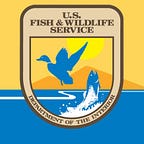Newly Minted Agreement Leverages a Long-Standing Partnership
Our National Conservation Training Center (NCTC) is uniquely focused on providing continuing education that develops skills, knowledge, and expertise needed to conserve America’s natural resources for future generations. It is the only training center of its kind.
It is fitting, then, that a new agreement signed in January 2022 between the U.S. Fish and Wildlife Service and the Native American Fish and Wildlife Society (NAFWS), commits the training center to expand its experience working with Tribal partners by collaborating to develop cutting-edge training. With the agreement, the Service, and its training center, is working to resolve urgent conservation challenges facing our nation and increase the agency’s relevance to the American people by bringing together diverse partners.
NCTC Director Steve Chase said, “The National Conservation Training Center is eager to strengthen its partnership with Tribal wildlife agencies. This new memorandum will enable us to engage in a more robust, strategic way to leverage expertise across the conservation community.”
The new agreement also allows, for the first time, members of the Native American Fish and Wildlife Society to access the training center’s professional and scientific literature resources. NCTC’s library of 20,000 indexed and full text scientific journals and databases, along with its curated collection of 9,000 circulating books, became accessible to members of the society in calendar year 2022.
In alignment with the America the Beautiful initiative, this expanded partnership will be collaborative, driven by identified areas of need for Tribal capacity as determined by the NAFWS and its member Tribes. It will create opportunities for better coordination between our local offices and partner Tribal wildlife agencies in conserving wildlife and fish resources, including rare and endangered species and their habitats on Tribal lands.
While the memorandum is new, partnering with Tribes is something the training center has done since it first opened its doors in the late 1990s. NCTC has provided training to Tribal communities and individuals on topics such as fish culture, fish health, and fish passage.
Some of the most beneficial NCTC Tribal training courses have been held on Tribal lands and fish hatcheries, including most recently in 2018 when the Southwest Tribal Fisheries Commission hosted a Fish Sampling Workshop for 11 Tribes.
Since 2015, the Native Youth Climate Adaptation Leadership Congress has been held at the center, bringing together high school and college youth from over 90 Tribes with high attendance by Tribes in the Southwest, Alaska, California and Pacific Northwest, Midwest, Rockies and Plains States, and from Maine.
In a separate agreement with the Native American Fish and Wildlife Society, the Service is providing approximately $465,000 to support the hiring of Tribal wildlife biologists. This award will help provide equity in funding between state and Tribal support from the Service.
These new agreements align with the existing Native American Policy of the Service around capacity building for and collaborative natural resource management with Tribes. The focused expansion of the NAFWS partnership will bring an increased exchange of knowledge and expertise — including cultural and ecological — with benefits for people, fish, wildlife and habitats.
Learn about our National Native American Programs.
Check out classes at the National Conservation Training Center.
Written collaboratively by Jim Siegel and Alan Temple, Curriculum Managers, in coordination with Sherry White, Division Manager, Division of Training National Conservation Training Center, and Vanessa Kauffman, Public Affairs Specialist, U.S. Fish and Wildlife Service headquarters.
